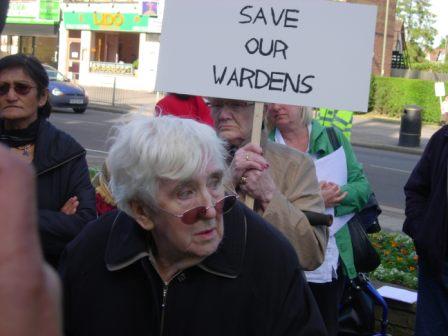Third aim outlined in the Cabinet Future Shape report (July 2009).
It is public money, so we must be transparent and accountable for every penny spent on public services. The impact of the global recession has already had a significant impact on Future Shape. The previous sentence reflects the vulnerability and complexity of decision making with regards to planning public services in the Future.
Politicians
The mainstream political parties are having a ‘bun fight’ at the moment on the true financial realities of public services. No doubt their message for public sector workers, will be we must accept the pain.
I am reminded of something a wise trade union colleague said at our lobby of Barnet Council Cabinet (6 July 2009) when he said this of politicians……
“Get real they will say,……we live in difficult times. You must feel the pain. I always find it strange that the people who tell us to feel the pain never have to feel it themselves!”
How true. I hope members remember this come election time!
As for staff in these extraordinary times it is even more apparent that we all recognise this and understand that in house services need to be high quality and value for money. We are already seeing a growing attack from the media, our pensions our pay. Incredible, public sector pay awards have consistently fallen behind inflation, yet the way our pay is discussed, you would think public sector workers were turning up to work in Ferrari’s, supping champagne.
So it is understandable public sector workers are not popular, with 4 out of 10 adults having lost their jobs, unemployment figures continue to rise, it is understandable that public sector workers are going attract negative attention.
There are still opportunities for savings in the public sector, but it does not have to be staffing that feels the pain first. Across public services & central government, there has got to be much more ‘commercially savvy’ procurement practice. It is worrying to hear how much public money is wasted by poor procurement practice, inadequate contract monitoring.
When we go into partnership with the private sector we need to make sure we understand the rules, because they do!
For those trying to understand what Barnet Council is trying to do you need look no further than to look at what has happened to Social Care provision in the UK.
Social Care in the UK
Over the past 20 years we have seen public services go out and come back , but one service that hasn’t returned is Social Care. The NHS & Community Care ACT 1990 marked the beginning of the end for in house Social Care services. The driving force of change was to turn NHS & Councils from providers to commissioners of services. Nationally, the majority of home care services are provided by the private sector, very few councils still provide residential or day care services. In Barnet we have outsourced, residential & day care for older people, sheltered housing, home care, meals at home
Some of you may have seen the Panorama documentary on Home Care services which documented a horrendous story of abuse of services users. In light of the fact that these services are no longer provided in house we need to have much more robust monitoring. If councillors believe it is better to privatise these services rather than direct provision then we need to scrutinise the delivery.
Social care provision must be regulated & monitored for service quality and value for money and the processes to ensure this is done be transparent. If you or a relative are receiving services then why not check it out with you Council, I know I would if a relative of mine had to receive social care services.
Here are the questions I would be asking.
Magnificent Seven Questions
- Does the Council/NHS Trusts regularly monitor home care & residential providers?
- Do you check the staff lists working on your contracts & ensure staff are CRB checked?
- Do you check staff turnover?
- Do you check what training staff are receiving?
- Do you visit the work place to check their records are up to date?
- Do you check on quality of the service?
- Do you work with services users & their carers to enable them to feel able to report concerns, without the fear of losing the service?
It is public money, we have the right to expect that all the above happens, but I expect that we could have Panorama reports from every council in the country. For many this experience only beomes real when someone close requires support and suddenly realise how important it is to feel confident to let a stranger play a key role for your family or friend. It is appalling to think that someone who has led an independent life could find themselves enduring horrendous abuse in the final years of their life.
The dogma ‘public bad, private good’ has dramatically changed social care provision, for the worse in my opinion. It is my view this has not led to the improvements the ‘dogma’ championed. Social Care provision should not been seen as a burdon on the state, it should be a statement of the sort of society we want to live in. When we gave up provision, we lost our knowledge & understanding of what providing social care is all about. The providers know we can’t easily bring services back in house and that puts Councils at a serious disadvantage.
The challenge to councillors, commissioners, procurement officers and contract officers is enormous.


